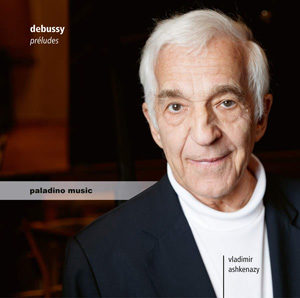Although Vladimir Ashkenazy no longer performs in concert as a pianist, he continues to record and to explore new repertoire, such as the complete Debussy Preludes. Book I stems from studio sessions held in October 2017, and, happy to report, Ashkenazy’s 80-year-old fingers prove impressively responsive to Debussy’s mercurial shifts in character and mood, as well as to the composer’s subtle dynamic shadings and gradations of pedaling.
Ashkenazy’s brisk and flexible Danseuses de Delphes liberates the music from the monumental shackles that certain pianists impose. He inflects Voiles’ melodic lines to the point where the whole-tone harmonies don’t sound static or immobile. Les collines d’Anacapri’s rapid tarantella-like phrases come off with point and sparkle, as do Ashkenazy’s vividly detailed left-hand accompaniments. Perhaps Ce qu’a vu le vent d’ouest’s dotted rhythms could be slightly more incisive, yet Ashkenazy compensates with a powerfully built-up climax. La serenade interrompue’s sultry accents and guitar effects are perfectly judged, with a sense of air between the notes that is better heard than described.
Careful voice leading and balancing of sonorities gives vital shape and direction to the long progressions of chords throughout La cathédrale engloutie. In contrast to many pianists’ rigid execution of La danse de Puck’s dotted motif, Ashkenazy toys with it offhandedly. However, there’s nothing casual about the pianist’s precisely judged handling of Minstrels’ lopsided cakewalk. The resonant yet clear engineering does justice to both the music and Ashkenazy’s conceptions.
Book II stems from a live 1971 performance that took place at New York’s Hunter College. No information is given about the source material; I suspect it’s a decent archival tape that captures the instrument and the hall ambience with sufficient concert hall realism. The tone thins out in the bass and turns strident at louder moments, together with occasional instances of wow and flutter. But your ears adjust easily. More significantly, the 44-year-old Ashkenazy is on prime form, and pretty much at the top of his technical and musical game.
He basks in Brouillards’ alluring half tints yet keeps the billowy textural strands refreshingly distinct. La puerta del vino is both swaggering and sexy, while Ashkenazy makes sheer poetry out of Les fees sont d’exquises danseuses’ rapid tracery and long trills. Granted, General Lavine-Eccentric and Ondine go a little too fast for the ear to absorb, but No. 11’s alternating thirds are a model of digital control and surface sheen, while the pianist’s staggeringly even passagework in Feux d’artifice beggars belief. He allows the notes in the climactic descending glissando to really speak, rather than whiz by for effect. In all, an unexpected and illuminating contribution to 2018 ‘s numerous Debussy anniversary releases, and a valuable addition to Ashkenazy’s piano discography.
































